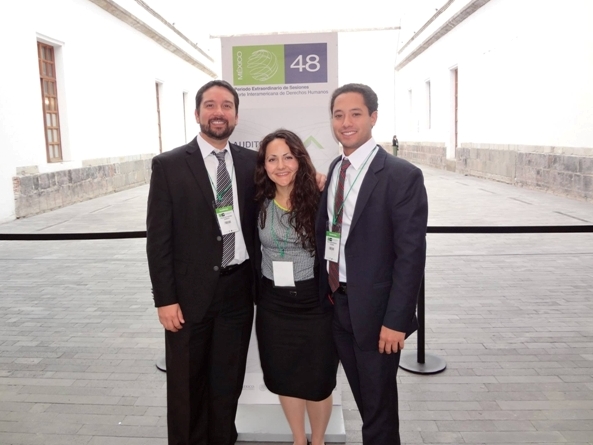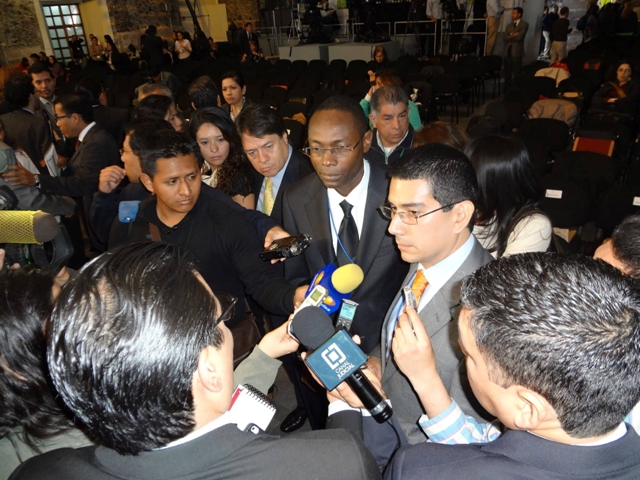Last week, IHRC students Taline Minassian and Matthew Toyama travelled to Mexico City with IHRC Director Francisco J. Rivera Juaristi to participate in a hearing before the Inter-American Court of Human Rights (“IACtHR”) in a case involving mass deportations in the Dominican Republic.
The IACtHR has its seat in Costa Rica, but often holds hearings in other countries of the region to promote its work. Mexico agreed to host the IACtHR’s 48th Special Session, in which the Court held two sessions – one to hear witness and expert witness testimony, as well as the arguments from the parties in the Benito Tide et al. v. Dominican Republic case, and the other to hear public comments on an advisory opinion addressing the rights of migrant children in the Americas. The students were there to hear the witnesses, talk to the parties’ attorneys, understand and identify the legal issues that seemed to catch the judges’ attention, and to gather any relevant information that would help the students as they prepare to draft and file an amicus curiae brief in the Benito Tide case.
As Matthew explains, “The case of Benito Tide et al. […] was originally brought to the Inter-American Commission in 1999[, and it addresses alleged] violations by the Dominican Republic in the context of massive expulsions of [Haitians and Dominicans of Haitian descent]. Fourteen years later, the plaintiffs received their day in court.” One of those plaintiffs, William Medina Ferreras, testified before the Court and explained how Dominican officers awoke him and his family at three in the morning, forced them to leave all their belongings behind and walk several miles to a detention center, where they were never taken before any administrative or judicial authority, and were subsequently deported to Haiti without any due process, even though Mr. Medina was born in the Dominican Republic and has evidence to show his Dominican nationality. Matthew remarked that the only thing Mr. Medina asked of the Court was to “give [him] back what [he had] lost.”
The Center for Justice and International Law (CEJIL), the Movement of Dominico-Haitian Women (MUDHA), the Support Group for Returnees and Refugees (GARR) and The Human Rights Clinic of the Columbia University School of Law, are serving as representatives of the plaintiffs and argued that what happened to the Medina family is evidence of institutional discrimination exerted against the Dominican population of Haitian descent and Haitian immigrants who have lived for many years in the country. The plaintiffs were able to make this argument in a proceeding that was broadcast live to the world via the internet and with hundreds in attendance. Matthew had this to say about this experience: “Sitting as a spectator of a live case before the Inter-American Court of Human Rights and watching a sovereign country do legal battle against […] plaintiffs with substantial allegations of international law violations, in a venue that billed over 7,000 registered attendees […], I easily realized that I was observing, and to my true pleasure, participating in, […] the cutting edge of law and order. Since […] World War II, […] the world has seen the coming of the age of international governance mechanisms to enshrine standards of human behavior […]. I should not soon be forgetting my attendance of the hearing of Benito Tide.”
The students also met one of the leaders of a Mexican teacher’s union. “We met him sitting under a makeshift tent shelter […] in the middle of Mexico City”, said Matthew. “They were on their fifty-first day of publicly protesting anticipated constitutional reforms which could negatively impact Mexico’s educational system.” For Matthew, the union leader and the witness in the Benito Tide case share something in common; they are both asserting their internationally recognized rights.
Taline also had very interesting insights on how clinical education exposes students to real-life experiences and how those experiences help students shed their fears about the unknown. What follows are her personal reflections on her experience.
“As I was reading a magazine on my flight back from Mexico City to the U.S., I saw the following written, ‘The No. 1 antidote to fear is experience. Say it with me! The No. 1 antidote to fear is experience.’ This quote beautifully captures my experience on this trip.”
“I was also anxious about the trip because I was not sure what to expect at the hearing[.] Now, in the plane back from my four-day trip to Mexico City, I understand that I should never have been afraid […]. The hearing was packed with thousands […] wanting to observe the case and yet, because of Professor Rivera’s personal connections, my partner and I, Matthew Toyama, were given a backstage pass and opportunity to meet several of the attorneys in the case. We were even able to meet Gisela de Leon, the powerhouse litigator for CEJIL ([…] the top human rights non-profit in Latin America) who gave us great insight on the case.”
“In reflection, ‘the No. 1 antidote to fear is experience’ is not only a great mantra for my personal experience in Mexico City but also as a general motto for clinic experience. Working on cases that will have a huge impact on the lives of others and human rights issues around the world can be incredibly powerful. The particular Benito Tide case I have been working on has been no exception to this, as it will have a huge impact throughout the Americas and on the thousands of Haitians and Dominicans of Haitian descent that have been expelled out of the Dominican Republic. However, knowing that my work in this field can affect the lives of others is also quite a frightening thought, which is why joining a clinic can be one of the most amazing experiences in law school. Clinical experience allows students like me the opportunity to be trusted to work directly on important legal cases and issues while still working under the friendly and supportive guidance of instructors that are experts in the field and are eager to teach students to be successful, practicing lawyers.”


Leave a Reply